Some Zimbabwe opposition leaders are unhappy with a complicated deal that sees Zimbabwean President Robert Mugabe relinquishing some power, officials said yesterday.
Two officials said the breakthrough gives opposition leader Morgan Tsvangirai control of the government and the police force that has been terrorizing the opposition.
Mugabe would control defense forces under the deal agreed on Thursday night after three months of tortured negotiations.
The two officials said Tsvangirai broke a deadlock by proposing a Council of State made up of Mugabe and two of his party’s deputies, and Tsvangirai and two of his deputies.
Two officials said Tsvangirai will be in charge of the Cabinet and Mugabe will be in charge of the Council.
The Council of State — which acts as an overseer of the Cabinet’s activities — is important since it gives Mugabe a significant role in government. This apparently led him to compromise and broke a deadlock in the talks.
Mugabe will have no veto powers on the Council, though its role remains unclear. However, two other officials said some opposition leaders are unhappy about the complicated deal.
Five officials spoke yesterday on condition of anonymity because of a media blackout.
Under the deal, the opposition Movement for Democratic Change (MDC) gets most seats in the Cabinet, 16 to 15 for Mugabe’s Zimbabwe African National Union-Patriotic Front (ZANU-PF). Tsvangirai’s party gets eight deputy ministries, Mugabe’s six and one goes to a breakaway opposition faction led by Arthur Mutambara.
The officials said the deal is detailed in a lengthy and complicated document that will take all weekend to prepare.
One official said the deal includes disbanding the southern African nation’s feared Central Intelligence Organization, which like the police comes under the mantle of the Ministry of Home Affairs, and replacing it with a smaller, more efficient National Security Authority.
It should be signed on Monday in Harare in the presence of South African President Thabo Mbeki and other regional presidents who mandated Mbeki to negotiate the peace agreement for the Southern African Development Community.
Mbeki was the man of the hour after clinching the hard-won power-sharing deal yesterday.
Welcoming Thursday’s agreement, UN Secretary-General Ban Ki-moon praised Mbeki’s “tireless efforts to help them [the Zimbabwean leaders] reach it.”
“He [Ban] hopes that this agreement will pave the way for a durable peace and recovery in the country and contribute to rapid improvement in the welfare and human rights of the people of Zimbabwe, who have suffered too long,” the UN chief’s office said in a statement.
South Africa’s ruling African National Congress, which is led by Mbeki’s rival Jacob Zuma, also described the deal as a “remarkable achievement” for Mbeki.
Analysts and Western observers reacted with caution however, saying the “devil would be in the detail.”
Western powers have said they would only support a government in which Tsvangirai was in charge.

Russia and Ukraine have exchanged prisoners of war in the latest such swap that saw the release of hundreds of captives and was brokered with the help of the United Arab Emirates (UAE), officials said on Monday. Ukrainian President Volodymyr Zelenskiy said that 189 Ukrainian prisoners, including military personnel, border guards and national guards — along with two civilians — were freed. He thanked the UAE for helping negotiate the exchange. The Russian Ministry of Defense said that 150 Russian troops were freed from captivity as part of the exchange in which each side released 150 people. The reason for the discrepancy in numbers

A shark attack off Egypt’s Red Sea coast killed a tourist and injured another, authorities said on Sunday, with an Italian Ministry of Foreign Affairs source identifying both as Italian nationals. “Two foreigners were attacked by a shark in the northern Marsa Alam area, which led to the injury of one and the death of the other,” the Egyptian Ministry of Environment said in a statement. A source at the Italian foreign ministry said that the man killed was a 48-year-old resident of Rome. The injured man was 69 years old. They were both taken to hospital in Port Ghalib, about 50km north

The foreign ministers of Germany, France and Poland on Tuesday expressed concern about “the political crisis” in Georgia, two days after Mikheil Kavelashvili was formally inaugurated as president of the South Caucasus nation, cementing the ruling party’s grip in what the opposition calls a blow to the country’s EU aspirations and a victory for former imperial ruler Russia. “We strongly condemn last week’s violence against peaceful protesters, media and opposition leaders, and recall Georgian authorities’ responsibility to respect human rights and protect fundamental freedoms, including the freedom to assembly and media freedom,” the three ministers wrote in a joint statement. In reaction

BARRIER BLAME: An aviation expert questioned the location of a solid wall past the end of the runway, saying that it was ‘very bad luck for this particular airplane’ A team of US investigators, including representatives from Boeing, on Tuesday examined the site of a plane crash that killed 179 people in South Korea, while authorities were conducting safety inspections on all Boeing 737-800 aircraft operated by the country’s airlines. All but two of the 181 people aboard the Boeing 737-800 operated by South Korean budget airline Jeju Air died in Sunday’s crash. Video showed the aircraft, without its landing gear deployed, crash-landed on its belly and overshoot a runaway at Muan International Airport before it slammed into a barrier and burst into flames. The plane was seen having engine trouble.